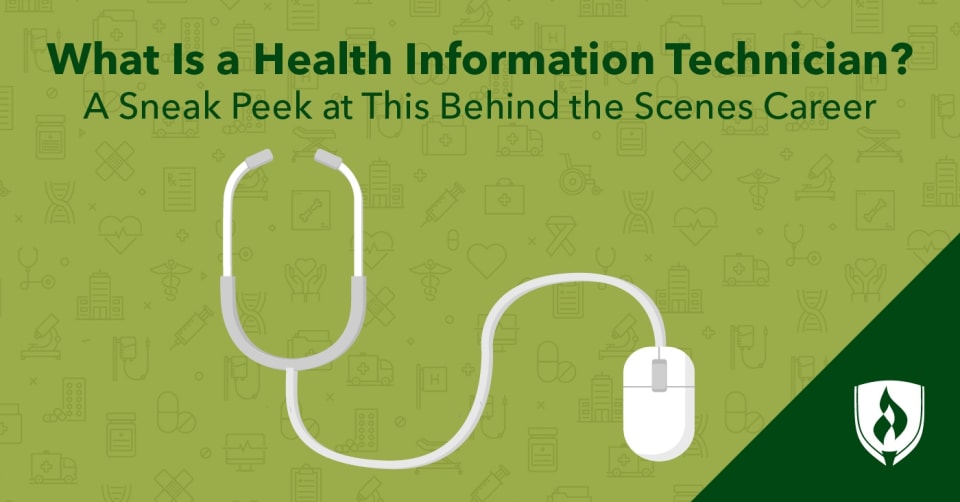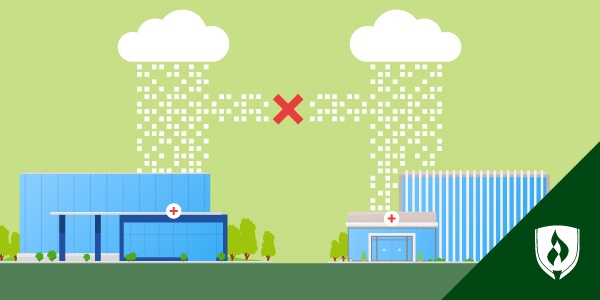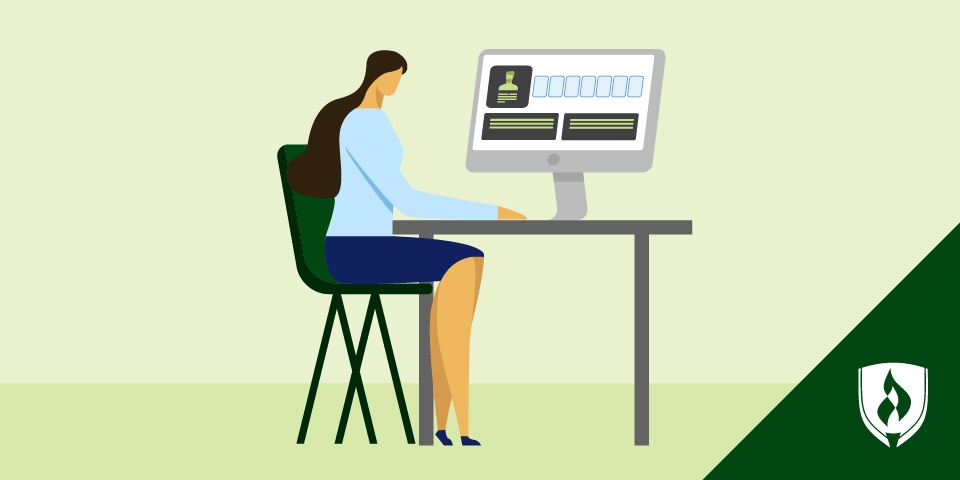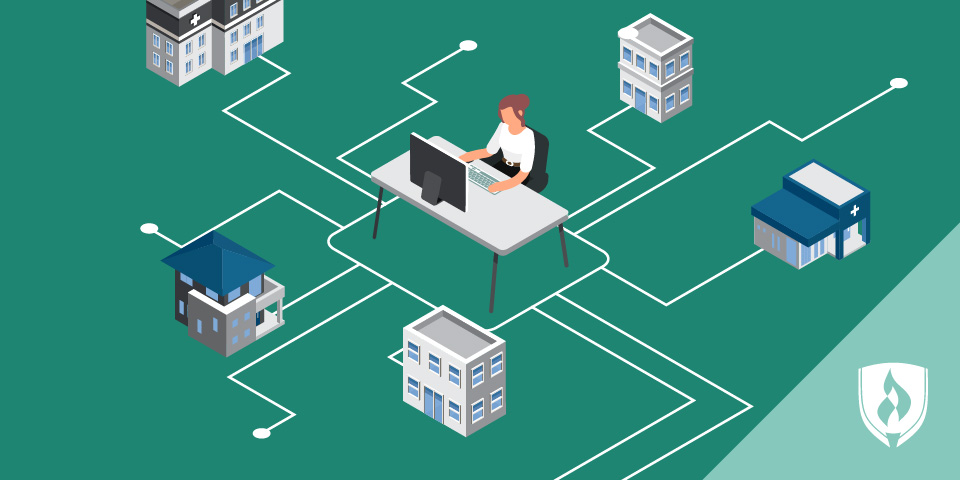What Is a Health Information Technician? A Sneak Peek at This Behind-the-Scenes Healthcare Career
By Will Erstad on 06/06/2022

Perhaps you didn’t know this, but the healthcare industry has undergone a massive transformation in the past couple of decades. Mass adoption of electronic medical records, widespread internet connectivity and improved electronic storage capabilities have quietly changed the way institutions manage the huge amounts of important health data tied to patient care.
These big changes also bring opportunities for those looking to establish a career on the administrative side of healthcare. There are many career paths within the health information field, and one role you should know more about is that of a health information technician.
So, what is a health information technician? In this article, we’ll take a closer look at the role, what it takes to become one and much more.
What is the role of information technology in healthcare?
At its core, health information technology (HIT) is about connecting all the moving parts of healthcare and helping them work together for a stronger, cost-effective and higher quality health system. Put simply, health information professionals use technology to help healthcare providers improve care and lower costs.
The goal is to effectively use and exchange healthcare data for better communication and decision-making among patients, providers, hospitals and insurers. While the system can get very technical, the work can drive efficiency, help providers and insurers avoid errors, and improve the overall effectiveness of our healthcare system.
What does a health information technician do every day?
So where does a health information technician fit into this? Simply put, technicians are responsible for much of the data input fueling these systems. To do this, they focus on obtaining, processing and documenting important healthcare information. It’s important to note that “health information technicians” is really more of an umbrella term for multiple health information roles, all with similar but varied focus areas. Related job titles can also include:
- Medical coder
- Health information clerk
- Health information specialist
- Medical records coordinator
- Medical record technician
According to the Bureau of Labor Statistics (BLS), medical records and health information specialists like these organize data for clinical databases, track patient outcomes, assign clinical codes for insurance reimbursement and record key data where it can be easily indexed and cross-referenced.1
Health information technicians also retrieve patient medical records for physicians and other medical personnel when needed. They maintain confidentiality and security standards to safeguard patient information.
Where do health information technicians work?
The adoption and expansion of electronic medical records systems mean this kind of work is needed in almost any healthcare facility.
“Typically, provider clinics or hospital settings are the most popular destinations for HIT graduates,” says Sandy Stevens-Berens, Rasmussen University Health Information Technician adjunct instructor. “Other settings include chiropractic offices, dental offices, nursing homes, billing departments and insurance companies.”
But that is only the beginning. Stevens-Berens says experienced health information technicians can move into auditor roles, cancer or trauma registrars, and supervisory roles—making HIT a great career choice for those who hope to advance as they go.
If you gravitate more toward the technological aspects of the job, Stevens-Berens says you might consider working for the companies that design and produce the systems and platforms for healthcare facilities. These companies may employ health information technicians to assist in a program’s deployment or development.
“Coders who obtain the necessary work experience and demonstrate the required quality and productivity standards may find opportunities to work remotely for a facility or for contract services,” she adds. An arrangement like this might allow you to make a work schedule that fits your preferences. HIT professionals who work in hospitals or other 24/7 healthcare facilities could have schedules that include nights, weekends or holidays.
What skills are needed to be a health information technician?
So, what do you need to succeed in this career? Let’s take a look at what employers are seeking. We used real-time job analysis software to examine more than 179,000 medical records and health information technician job postings from the past year. The data helped us identify the top skills employers want from health information technician candidates:1
- Medical coding
- Customer and medical billing
- Medical records
- ICD-10 coding
- Customer service
- Health information management (HIM)
- Data entry
- CPT coding
- Medical terminology
To that list, Stevens-Berens adds digital fluency with the Microsoft Office® suite and other applications as important skills for health information technicians.
As you can see, the work of a health information technician is quite technical. But don’t let that intimidate you—these are precisely the types of skills you’ll acquire in a Health Information Technician program.
It’s not all about technical skills either. Being an effective communicator is critical to collaborating with other medical professionals. “The most important skill is communication—both verbal and written forms,” Stevens-Berens says, adding that proper grammar and spelling are key.
The BLS also lists analytical abilities, a detail-oriented mindset and personal integrity as critical skills for this career. That final skill is particularly important, as health information technicians work with highly confidential patient data protected by law.
What education and training do I need to become a health information technician?
Educational and training requirements can vary depending on the specific role. Some lower-level health information and medical records roles only require a high school diploma. Others will prefer candidates with postsecondary education, like a Medical Billing and Coding Certificate or even associate’s or bachelor’s degrees.
Professional certifications are also a big piece of the puzzle to keep in mind, as many employers prefer or even require candidates to obtain one.
There are several certification options available to health information professionals. Our job analysis helped us identify some of the most commonly sought-after HIT-related certifications:1
- Registered Health Information Technician(RHIT)®
- Certified Coding Specialist – Physician-based (CCS-P)®
- Certified Coding Associate(CCA)®
- Registered Health Information Administrator(RHIA)®
- Certified Coding Specialist(CCS)®
Do you have a future in HIT?
Health information technicians play an essential role in a thriving industry dedicated to improving the healthcare experiences of those who need it most. They bridge the gap between healthcare services and critical technology in an industry that depends on their merging.
“If you want a broad base of education that can lead to diverse opportunities, I would recommend HIT,” Stevens-Berens says.
If you’d like to take the next step toward a health information career, start with the Health Information Management Studies page to learn more about the array of education programs available. With programs ranging from a Certificate that can be completed in as few as nine months to a Bachelor’s degree, you’ll have options for finding a program that fits your needs.3
Related Articles:
- Becoming a Registered Health Information Technician: What You Need to Know
- 5 Signs You'd Excel in Health Information Technology Careers
1Burning-Glass.com (analysis of 179,503 medical records and health information technician job postings, May 1, 2021 - Apr. 30, 222.)
2Bureau of Labor Statistics, U.S. Department of Labor, Occupational Outlook Handbook, [information accessed May 2022] www.bls.gov/ooh/. Employment conditions in your area may vary.
3Completion time is dependent on the number of transfer credits accepted and the number of courses completed each term.
Microsoft Office is a registered trademark of Microsoft Corporation.
Registered Health Information Technician, Certified Coding Associate, Registered Health Information Administrator and Certified Coding Specialist are registered trademarks of the American Health Information Management Association (AHIMA).
Certified Professional Coder is a registered trademark of American Academy Holdings, LLC.
EDITOR’S NOTE: This article was originally published in March 2016. It has since been updated to include information relevant to 2022. Insights from Stevens-Berens remain from previous article.




